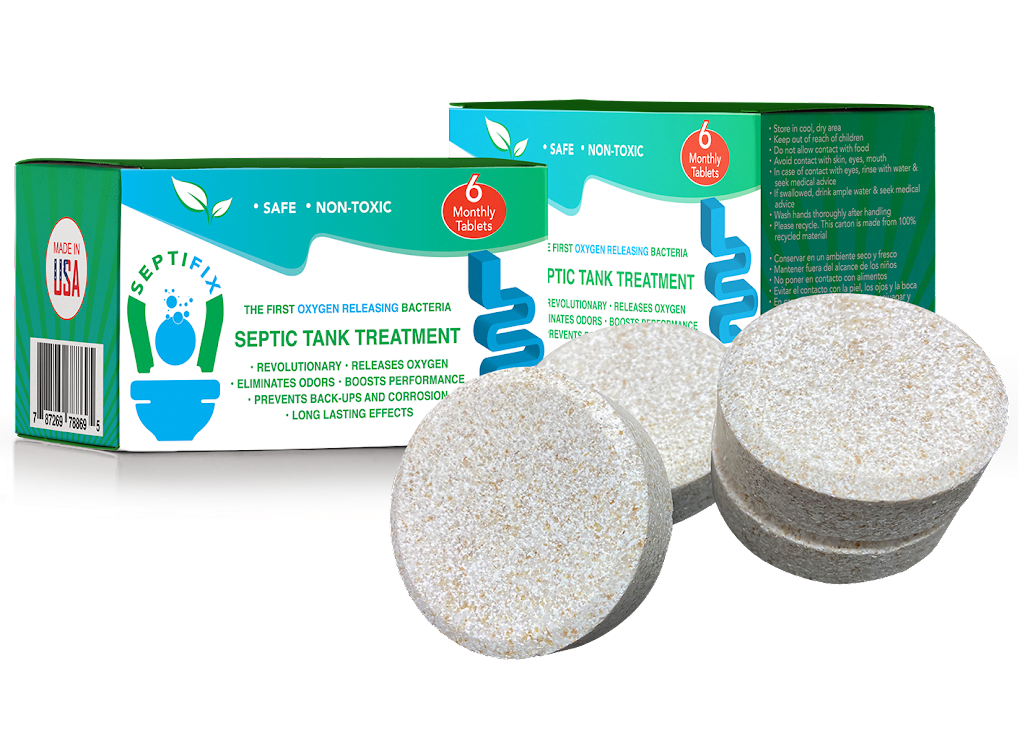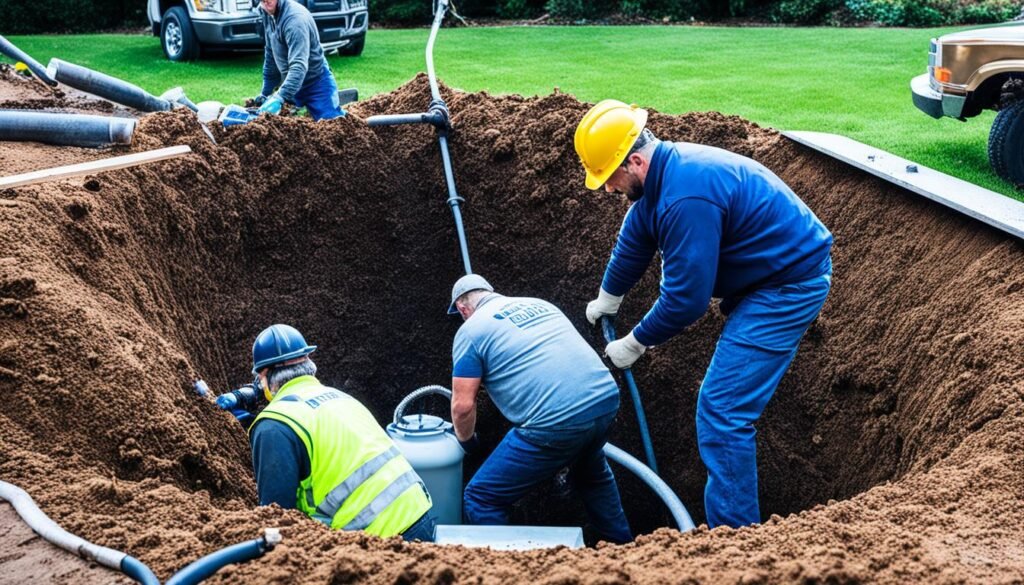Knowing how your home works, especially the septic system, is critical. Good septic system care can save you a lot of money: maintenance and regular pumping costs between $100 and $300.
Ignoring these can cause big repair bills, from $3,000 to $10,000. Regular checks help keep your system running well for up to 30 years. This makes sure your septic system lasts a long time.
Key Takeaways
- Proper maintenance can extend your septic system’s life to 25-30 years.
- Routine pumping costs significantly less than system repairs or replacements.
- Neglecting septic tank maintenance can lead to repairs costing $3,000 to $10,000.
- Understanding your septic system is essential for its long-term functionality.
- Regular septic tank service is crucial for septic system longevity.
Understanding How Your Septic System Works
Septic systems are crucial for dealing with household wastewater. They use nature’s methods to treat and dispose of it under the ground. A septic system has several essential components working together. Knowing these components and how they work helps keep the system running smoothly.
Components of a Septic System
The key parts of a septic system are the septic tank and the drain field. The septic tank is where wastewater first goes. Here, it gets its primary treatment. Wastewater from your home flows into the septic tank, which separates the solids and liquids.

SEPTIFIX will save you hundreds, if not thousands of dollars each year, because your septic system will run smoothly and you won’t have to worry about calling the pumpers or a plumber for a fix!
Click here to save up to 50%
Solids drop to the bottom, creating sludge. Lighter materials like grease rise to the top, making scum. Bacteria in the tank break these materials down. This stops them from building up too fast.
Functionality of the Septic Tank and Drain Field
Septic tank functionality is key. It separates and initially treats wastewater. The middle layer of liquid, called effluent, moves to the drain field. This fluid leaves through pipes with holes buried in the ground. It’s important to understand how the drain field operates.
The drain field filters the effluent further, letting the fluid soak through the soil. This process removes any remaining bad stuff in the water.
Keeping the septic tank and drain field in good shape is vital. It would help if you pumped out the tank every three to five years. This keeps sludge and scum levels low. Doing this helps your system work well for a long time.
Routine Septic Tank Maintenance
Keeping your septic system in good shape is key. It helps your home’s wastewater system last longer. Regular care prevents major repairs and ensures you follow rules like the 2005 septic system regulations (WAC 246-272A).
Recommended Maintenance Schedule
It’s important to stick to a maintenance schedule. If you have a pump system, check it every year. Gravity systems need a look every three years. During inspections, check for sludge, scum, and damaged baffles. Getting these checks can prevent bigger problems and keep your system running well.
DIY vs. Professional Maintenance
You can choose to handle home septic care yourself or get a pro. Doing it yourself saves money, but you must know what you’re doing. It might not be as thorough as hiring an expert. Professional maintenance offers detailed checks and solves problems quickly. This can give you confidence and keep your system in better shape.
Importance of Regular Septic Tank Pumping
Regular septic tank pumping keeps your system healthy and efficient. Removing solids regularly prevents backups and pollution. Professional services help your system work smoothly and last longer.
Frequency of Pumping
Septic tanks should be pumped every three to five years, depending on your home’s size, water use, and waste volume. Always consult a professional for personalized advice to protect your system and the environment.
What to Expect During a Pumping Service
A professional will first find and open your tank’s lids. They’ll check for leaks or damage. Then, they’ll remove the collected sludge and scum with special gear.
The tech also measures sludge levels to ensure a complete clean. It’s key to keep detailed records of cleanings. These help in property sales or if the system fails.

SEPTIFIX will save you hundreds, if not thousands of dollars each year, because your septic system will run smoothly and you won’t have to worry about calling the pumpers or a plumber for a fix!
Click here to save up to 50%
| Event | Description |
|---|---|
| Locating the Tank | Access lids are uncovered to reach the tank. |
| Inspections | Check for leakage and structural issues. |
| Pumping | Sludge and scum are removed using specialized equipment. |
| Measurements | Sludge layers are measured to ensure thorough cleaning. |
Regular check-ups by experts also spot system health issues. They offer ways to keep your tank in top shape, avoiding sudden problems. Stick to a routine service schedule for a safe and efficient system.
Efficient Water Usage to Reduce Strain
Saving water is key to easing your septic system’s workload. On average, each person uses about 70 gallons daily. By using less water, we help both the planet and our septic systems work better.
Tips to Conserve Water
Small changes in how we use water can make a big impact. Here are smart ways to save:
- Install flow reducers: Put flow limiters on faucets and showers to use less water.
- Fix leaks immediately: Fixing leaks stops wasted water and helps your septic system.
- Use Energy Star appliances: Choose appliances like washing machines with the Energy Star label to save water.
- Full loads only: Wait until the dishwasher or washing machine is full before running them.
Impacts of Leaks on Your Septic System
Leaks are bad news for septic systems. Even small leaks waste a lot of water, increasing the flow through the system too fast. The system can fill up sooner, but it might break down. So, fixing leaks fast is crucial for a healthy septic system.
| Conservation Method | Water Saved Per Year |
|---|---|
| Fixing Leaks | Over 10,000 gallons |
| Installing Flow Reducers | Approximately 7,000 gallons |
| Energy Star Appliances | Up to 20% reduction in water use |
Making these water-saving habits part of your life can greatly ease the strain on your septic system and keep it working well for longer.
Proper Disposal of Waste
Proper waste disposal is crucial for ensuring your septic system works well. Wrong items can cause blockages or system failure, so it’s crucial to be careful about what goes down the drain.
Avoiding Non-Biodegradable Materials
Avoiding non-biodegradable materials is key to septic care. Plastic, diapers, and feminine hygiene products won’t break down, but they can block the system. Throwing these items in the trash helps keep the system efficient.
Specific Items to Keep Out of Your Septic System
There are several items you should never put in your septic system:
| Item | Reason |
|---|---|
| Oils and Grease | Can solidify and block pipes |
| Certain Food Waste | Slow to decompose and can cause clogs |
| Chemicals | Can kill beneficial bacteria that aid in waste breakdown |
| Medications | May disrupt biological processes within the system |
Educating your household on proper waste disposal is a team effort. Teach everyone what shouldn’t be flushed or washed down the drain. This will protect your septic system and avoid expensive repairs.
Safe Cleaning Practices
Keeping your septic system healthy is key to its long-lasting performance. The use of septic-safe cleaning products at home is important. Choosing eco-friendly cleaning products can greatly help your septic system’s health.
Impact of Chemicals on Septic System
Household cleaning products can harm your septic system. Chemicals like bleach and ammonia kill good bacteria needed to process waste. Without these bacteria, your septic tank might get blocked or build up sludge.
Products not made for septic-safe cleaning can harm your system, so watching what chemicals go into it is crucial.

Alternative Cleaning Products
Choosing eco-friendly cleaning products is smart for homes with septic systems. Products free from harsh chemicals protect the bacteria balance in the septic tank. Brands like Seventh Generation and Eco-Me have septic-safe solutions.
Items like vinegar and baking soda are great natural cleaners. They help keep your septic system safe. Using these can keep your home clean without harming your septic system.
Ultimately, septic-safe cleaning methods and eco-friendly products benefit your home and septic system. They ensure your hygiene practices don’t compromise the system’s health.
The Role of Bacteria in a Septic Tank
Keeping the right amount of bacteria in your septic tank is key. These microbes help break down waste, improving the system’s performance.
Importance of Bacterial Balance
A good mix of bacteria in a septic tank is vital for breaking down waste. These microbes prevent clogs and keep the system running smoothly. Waste doesn’t break down well without them, causing possible system failures.
How to Maintain Healthy Bacteria Levels
Be mindful of what you put down the drain for healthy septic bacteria. Avoid strong cleaners and antibacterial products, as they can harm good bacteria. Also, don’t flush non-biodegradable stuff. This helps keep the bacteria happy and your septic system healthy.
| Household Habit | Impact on Septic Health |
|---|---|
| Minimal Use of Antibacterial Products | Preserves beneficial septic tank bacteria |
| Proper Waste Disposal | Maintains microbial balance |
| Avoiding Chemical Drain Cleaners | Prevents disruption of bacterial ecosystem |
Managing Your Drain Field
The drain field is crucial to your septic system, filtering waste naturally. It’s vital to maintain it well to keep your system running long.

SEPTIFIX will save you hundreds, if not thousands of dollars each year, because your septic system will run smoothly and you won’t have to worry about calling the pumpers or a plumber for a fix!
Click here to save up to 50%
Signs of Drain Field Failure
Septic system failure signs shouldn’t be ignored. They save time and money. Soggy ground, bad smells, and uneven grass signal drain field problems. These are signs the effluent isn’t being absorbed right, leading to bigger issues.
Best Practices for Protecting Your Drain Field
To prevent problems, follow drain field care tips. Make sure water flows away from the field. Don’t park cars on it. Keep away deep-root plants that could harm pipes. Regular checks and fixes are crucial for its health.
Keeping your drain field in shape means more than just regular checks. You also need to ensure it’s not overloaded. Following these steps will make your septic system last longer and save on repairs.
Understanding Septic Tank Repairs
Keeping your septic system in good shape is vital to avoiding costly repairs. Sometimes, though, you might face issues that need fixing. Dealing with these problems quickly can save you both time and money.


SEPTIFIX will save you hundreds, if not thousands of dollars each year, because your septic system will run smoothly and you won’t have to worry about calling the pumpers or a plumber for a fix!
Click here to save up to 50%
Common Issues and Solutions
Septic systems can face a variety of issues, from small to big. Clogs, leaks, and failing drain fields are common. Reducing water use or adding bacteria might help for minor issues. However, serious problems like ongoing blockages or structural damage need more extensive repairs.
Here’s a quick guide:
| Issue | Common Solutions |
|---|---|
| Clogs | Aerate soil, replace drain field and consult with professional septic services. |
| Leaks | Reduce water usage, use enzyme treatments, and have the tank pumped. |
| Drain Field Failure | Aerate soil, replace drain field, consult with professional septic services. |
When to Call a Professional
Some small repairs can be done without help, but knowing when to call experts is important. Look out for slow draining, backups, bad smells, and green grass over the drain field. Getting help from pros quickly can solve big issues effectively. Always act fast at the first sign of trouble to keep your septic system running well.
Special Considerations for Alternative Septic Systems
Choosing alternative septic systems means understanding their special features and care needs. These systems can use sand filtration or evaporation, which are different from standard ones.
Variations in Septic System Types
Homeowners might see gravity-fed or pump-based septic systems. Each kind has its way of working and advantages, which call for certain ways to inspect and care for them.
Pump-based systems might need checks more often. They have parts that must be checked regularly to work right.
Unique Maintenance Requirements
Alternative septic systems require more special care than regular ones. For example, you must monitor sand filters to avoid blockages and ensure that evaporation fields work properly.
Knowing these unique care steps is crucial. It helps keep the system efficient and lasting longer. Tailored care prevents problems and boosts performance.
How to Identify Problems Early
Taking care of your septic system’s health helps avoid big repair costs. It’s key to spot early signs of problems. Plus, taking the right steps in preventive care keeps your system running well.
Warning Signs to Watch For
Several signs might indicate trouble with your septic system. Odd smells around your house can indicate trouble. Also, if you hear your plumbing making strange noises, see sewage backing up, or find damp spots near your septic tank, these could point to issues.
Preventative Measures
Follow a few tips to keep your septic system in shape and avoid big problems. Get regular checks to catch any issues early. Make sure you only flush things that break down easily. Also, using water wisely removes some pressure from your system, helping it last longer.
| Preventative Measure | Benefits |
|---|---|
| Regular Inspections | Early problem identification lessens the risk of major system failures |
| Proper Waste Disposal | Prevents blockages and system overloads |
| Efficient Water Usage | Reduces strain on the septic system and prolongs its lifespan |
Conclusion
Managing your septic tank well is key to keeping it working properly for a long time. Sustainable steps like regular upkeep, using water wisely, and disposing of waste properly help a lot. They also ensure that your septic system works with fewer problems.
Following best practices will improve your septic system’s performance. Getting it pumped and checked often catches issues early. Using less water and avoiding harsh chemicals keeps the good bacteria in balance. Knowing what your specific septic system needs is also crucial.
To sum up, carefully caring for your septic system makes it last longer and work better. By using these eco-friendly practices, you do good for your home and the environment. Attention to these practices means your septic system will serve your home well.#
FAQ
How often should I perform septic tank maintenance?
You should maintain your septic tank every three to five years. Doing so prevents big repair costs and keeps the system working well.
What components make up a septic system?
A septic system has a tank and a drain field. The tank treats the water, while the drain field filters it further.
What is the functionality of a septic tank and drain field?
The septic tank divides solids from lighter substances. The effluent then goes to the drain field for filtering. Good bacteria in the tank are important for breaking down wastes. That’s why it’s key to keep the system maintained.
What is the recommended maintenance schedule for septic systems?
Inspect pumped septic systems yearly, and gravity-fed systems every three years. Regular checks keep your system running right and meet rules like WAC 246-272A in Washington.
Should I handle septic maintenance myself or hire a professional?
Homeowners can do simple checks and upkeep if they know how. Yet, pros should do the big jobs like inspections, pump-outs, and fixing parts to keep the system healthy.
How frequently should a septic tank be pumped?
Pump your septic tank out every three to five years. This keeps it from getting too full, which can cause backups and pollute the environment.
What activities are involved in a septic tank pumping service?
Pumping service looks for leaks and checks solid waste levels. They then clean out the waste to keep the tank running well. Keeping track of maintenance tasks is a good idea.
How can I conserve water to reduce strain on my septic system?
To save water, fix leaks fast and use flow reducers. Choose Energy Star appliances and use them wisely. A person uses about 70 gallons of water a day. Saving water can make your septic system last longer.
What items should I avoid putting into my septic system?
Don’t put non-biodegradable stuff like plastics or diapers in your system. Also, avoid oils, grease, and some food scraps to stop clogs.
How do household chemicals impact the septic system?
Strong chemicals can kill the bacteria that break down waste. Use less bleach, skip chemical drain cleaners, and choose natural cleaning products to keep the bacteria healthy.
Why is bacterial balance important in a septic tank?
Bacteria in the tank help break down wastes, which is vital for the system to work right. Too much chlorine or antibacterial products can mess this up, causing problems.
What are the signs of drain field failure?
Signs include soggy soil, bad smells, or extra green grass around the drain field. Keep an eye out and manage it well to avoid trouble.
What common issues might occur with septic systems, and how can they be resolved?
Issues like clogs, leaks, and drain field problems can happen. Save water or get repairs as needed. Watch for slow drains or sewage backups as warning signs.
What special considerations are there for alternative septic systems?
Special systems like sand filtration need different care. Know what your system requires to keep it working right.
What are the early warning signs of septic system problems?
Watch for odd smells, gurgling sounds, sewage problems, or wet ground near the tank or drain field. Deal with these issues early to avoid big repair costs.


